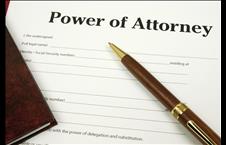 A daughter taking over the care of her mother recently diagnosed with dementia goes to the bank to handle her bills, only to be turned away because she has no authority to handle her mother’s account. Imagine her frustration… Because her mother did not plan beforehand for her disability, the daughter’s only option now is a guardianship proceeding through the court.
A daughter taking over the care of her mother recently diagnosed with dementia goes to the bank to handle her bills, only to be turned away because she has no authority to handle her mother’s account. Imagine her frustration… Because her mother did not plan beforehand for her disability, the daughter’s only option now is a guardianship proceeding through the court.
One of the common documents that is part of an Estate Plan is the “Durable Power of Attorney.” What makes this document so powerful? Essentially, the designation of a Power of Attorney allows you to give financial decision-making power to someone you trust. You get the option of making it effective immediately, which may be beneficial for spouses, or to make it effective in the event of your disability.
This Durable Power of Attorney allows the person of your choosing to carry on your financial affairs in the event that you become disabled. Unless you have a properly drafted power of attorney or other estate planning, it may be necessary to apply to a court to have a guardian appointed to make decisions for you when you are disabled. This guardianship process is time-consuming, expensive, emotionally draining and often costs thousands of dollars. Having this one document in place can save time, stress, and money. Now that is a powerful piece of paper!
There are generally two types of durable powers of attorney: a "present" durable power of attorney in which the power is immediately transferred to your agent; and a future durable power of attorney that only comes into effect upon your subsequent disability as determined by your doctor. When you appoint another individual to make financial decisions on your behalf, that individual is called an “agent” or "attorney-in-fact". Anyone can be designated, most commonly your spouse, a trusted family member or friend. Appointing an agent under power of attorney assures that your wishes are carried out as you want them and allows you to decide who will make decisions for you, not the court.